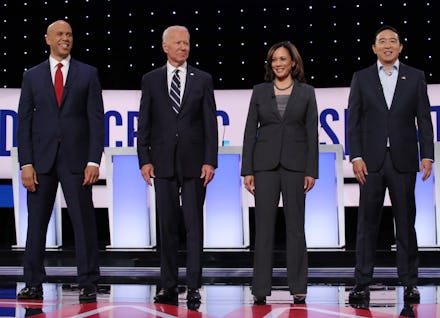Why these 3 important issues might get ignored at Thursday's Democratic debate

On Thursday night, 10 presidential hopefuls will take the stage at Texas Southern University in Houston for the third Democratic debate. After a summer filled with endless tragedies and crises, there will be plenty of subjects for the candidates — Sens. Bernie Sanders, Elizabeth Warren, Kamala Harris, Amy Klobuchar, and Cory Booker, plus former Housing and Urban Development Secretary Julian Castro, former Texas Rep. Beto O’Rourke, former Vice President Joe Biden, South Bend Mayor Pete Buttigieg, and tech entrepreneur Andrew Yang — to opine on, from climate change and gun control to health care and immigration.
But with such a crowded stage, there won’t be enough time for everything. What might get nixed in the interest of time and virality? Here are three important issues to remember — even if the candidates forget them Thursday night.
Reparations
A breakout issue in the first two debates, the topic of reparations has somewhat receded from the national consciousness. Sanders, O’Rourke, Warren, Harris, Klobuchar, and Castro have all stated they would at minimum support a bill to form an exploratory committee around reparations — legislation that was introduced by Booker this past April. Booker’s bill is “the only reparations bill ever to be introduced in the post-Reconstruction U.S. Senate," his team touted, and would establish a commission to study the legacy of slavery in order to eventually make recommendations on reparations proposals.
Thursday’s debate will span three hours, but given the glut of candidates on stage and the looming threat of another recession, the question of reparations may be relegated to a smaller point in a broader discussion about the economy. Rather than focus on specific communities that are affected by income inequality, candidates may instead spend more time focusing on how their plans will be better than President Trump’s — a dual-pronged approach meant to highlight their proposals while also implicitly making their case for the general election.
Women’s rights
Sen. Kirsten Gillibrand (N.Y.) was the candidate in the race most well-versed in advocating specifically for women, and she built her candidacy on highlighting gender equality issues. With Gillibrand's decision last month to end her campaign, debates about abortion access and pay inequality may take a backseat to other topics, particularly as gun violence and natural disasters have buffeted the country in recent weeks.
Additionally, in a Democratic field where most candidates have stated similar stances on women’s issues — namely, that equality is important and achieving it is a fundamental necessity — the candidates may instead be pressed on other topics where they can draw distinctions between themselves as the fall campaign season continues. One thing to look out for here, though, is attacks on Biden’s previous stances about reproductive rights, as well as his role questioning Anita Hill and questions about his conduct with women. As the candidate polling in the top spot, Biden’s history on women’s issues is perceived to be one of his weaker areas, and his opponents may try to capitalize.
The war in Afghanistan
The U.S. has been at war with Afghanistan since 2001 — the longest war in our country’s history. Recently, Trump was supposed to meet with Taliban leaders to negotiate peace talks, but he canceled those discussions after the organization took responsibility for launching a large-scale attack on the city of Kunduz. Public support for the war has dwindled in recent years, though some Afghan officials have expressed concerns about the outcome of U.S. troops leaving the country.
But the American public has displayed a stunning penchant for amnesia when it comes to the country’s longest military conflict, as evidenced by how little space it takes up in public discourse. And with other foreign relations issues more consistently making headlines recently — the trade war with China, investigations into Russian interference with U.S. elections, and threats of war with Iran — our involvement with Afghanistan may not get enough time from the candidates.